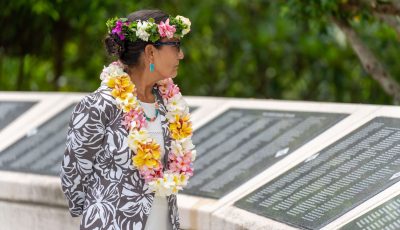RESOLUTION FOR TERMINATION OF COMPACT BY 2018
‘Resolution has implications for FSM citizens’
The administration of Gov. Eloy S. Inos understands the concerns posed by Federated States of Micronesia citizens living in the CNMI about a resolution introduced in the FSM Congress that calls for the early termination of its Compact of Free Association with the United States. The Compact allows FSM citizens to travel freely, live, and work in the United States and its territories, including the CNMI.
Press secretary Ivan A. Blanco said FSM citizens living in the CNMI are concerned about the resolution because it may affect their immigration status and their livelihoods.
“Many FSM citizens have made the CNMI their home with their families and have contributed tremendously to the social and economic development of the CNMI,” said Blanco yesterday when asked for comment about the resolution.
However, since this is a matter between sovereign nations, Inos and acting governor Ralph DLG Torres are not in a position to comment on the specifics of the matter, he said.
The resolution, introduced by Sens. Peter Christian (Pohnpei), Robson Romolow (Chuuk), Bonsiano F. Nethon (Chuuk), and former FSM speaker Isaac Figir (Yap), calls for President Manny Mori to terminate the Compact of Free Association between FSM and the United States by 2018.
The resolution noted that, “the recent words and deeds of United States policymakers suggest they view the Amended Compact as an act of charity by the United States rather than a treaty between two sovereign nations.”
The resolution accuses the United States of abusing its majority role in the U.S.-FSM Joint Economic Management Committee to force through resolutions contrary to the FSM’s interests, such as “unilaterally making drastic cuts to the funding of the College of Micronesia-FSM without prior discussion or consultation with leaders of the Federated States of Micronesia.” The FSM lawmakers were also angered by a recommendation from the U.S. Senate Committee on Appropriations that the U.S. Department of Homeland Security consider establishing a pre-screening process and requiring advanced permission for prospective travelers from FSM and other Freely Associated States to enter the United States.
‘Labor issues’
According to Senate Committee on Foreign and Federal Relations chair Sen. Arnold Palacios (R-Saipan), the federal government needs to step in and deal with the issue as stated in the original Compact agreement.
For the FSM community on Saipan, he said, “I can see the possibility of labor issues in the CNMI as we will be unable to tap easily into that labor pool.”
Palacios said the matching of federal funds for medical and housing needs will be affected, saying that there’ll be many implications, including FSM citizens being considered foreigners, therefore complicating immigration issues and an eventual loss of opportunities.
In terms of national security and military access, he said the United States has a lot to lose if the agreement ends in 2018, allowing FSM the freedom to decide or give access in their specific region in Micronesia to other military organizations in the world.
Delegate Madeleine Bordallo (D-GU) pointed out, though, that the resolution, introduced on Nov. 19, has still not been voted on or adopted by the FSM Congress.
“I believe that the Compacts are an important national security and economic agreement between the U.S. and FAS that provide mutual benefits for our nations. Additionally many FAS citizens who have migrated to Guam contribute to our community and add to the vibrancy of our island,” Bordallo said. “…It is important to find ways to balance our relationship with the FAS with the concerns that have been raised by local policymakers…[in] affected jurisdictions.”
Since the implementation of the Compacts of Free Association with the Freely Associated States (FSM, Palau, and Marshall Islands), many citizens from these nations have legally migrated to Guam and Hawaii for health, education, and work purposes.
Based on Census 2000, out of 4,091 FAS citizens in the CNMI, 3,990 live on Saipan.
Under current federal law, annual mandatory funding for Compact Impact Aid is capped at $30 million. The funding is shared between Hawaii, Guam, the CNMI, and American Samoa.
Compact Impact discretionary funding averages around $3 million, according to the Office of Insular Affairs.
Since the early 2000s, FSM have been receiving and developing relations with the government of the People’s Republic of China for the FSM Trust Fund. In 2006, China approved a $25-million loan for Pacific allies, which included FSM assistance with Internet access as well as $2.5 million in grant assistance. (with Daisy Demapan)



























